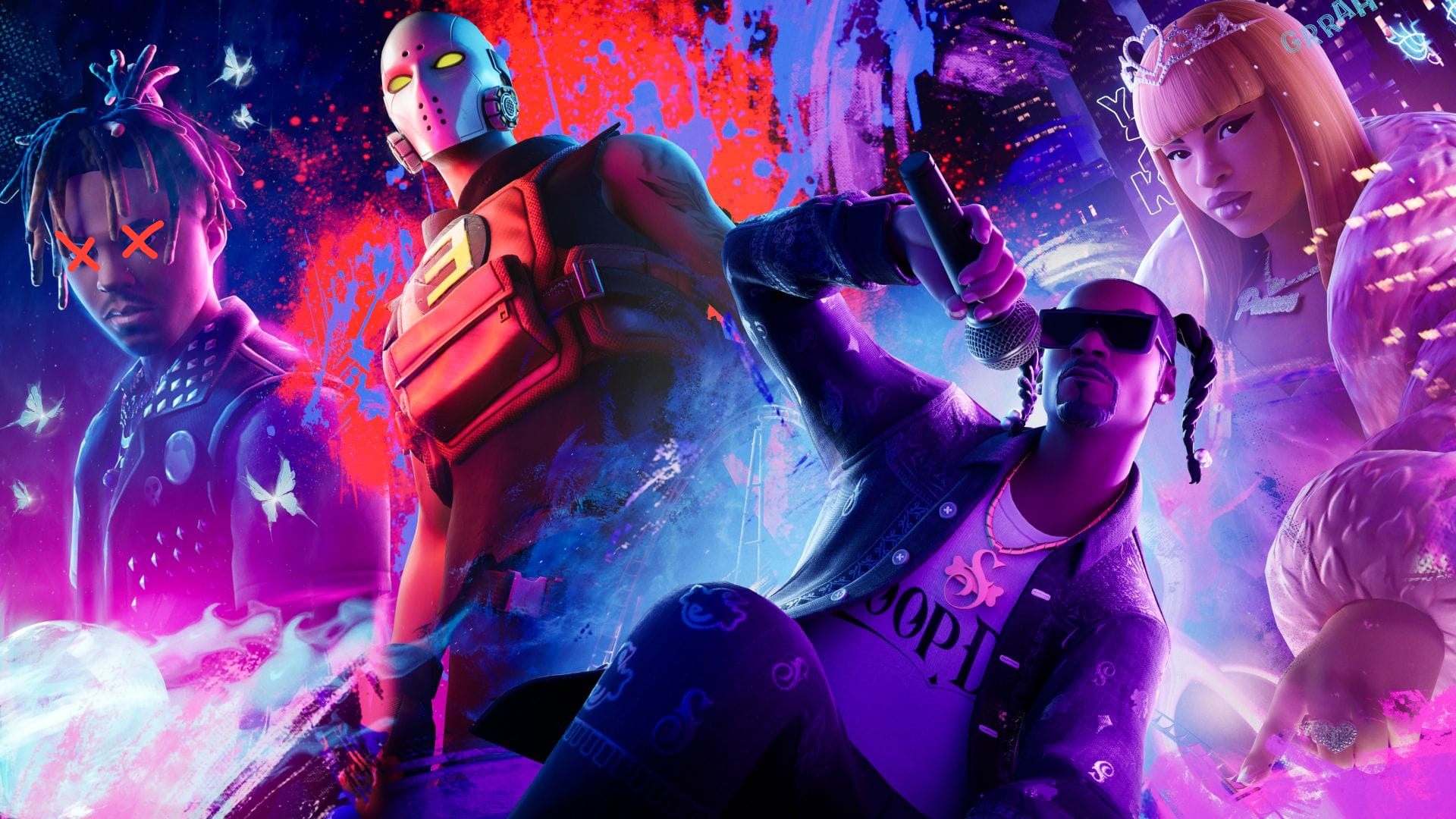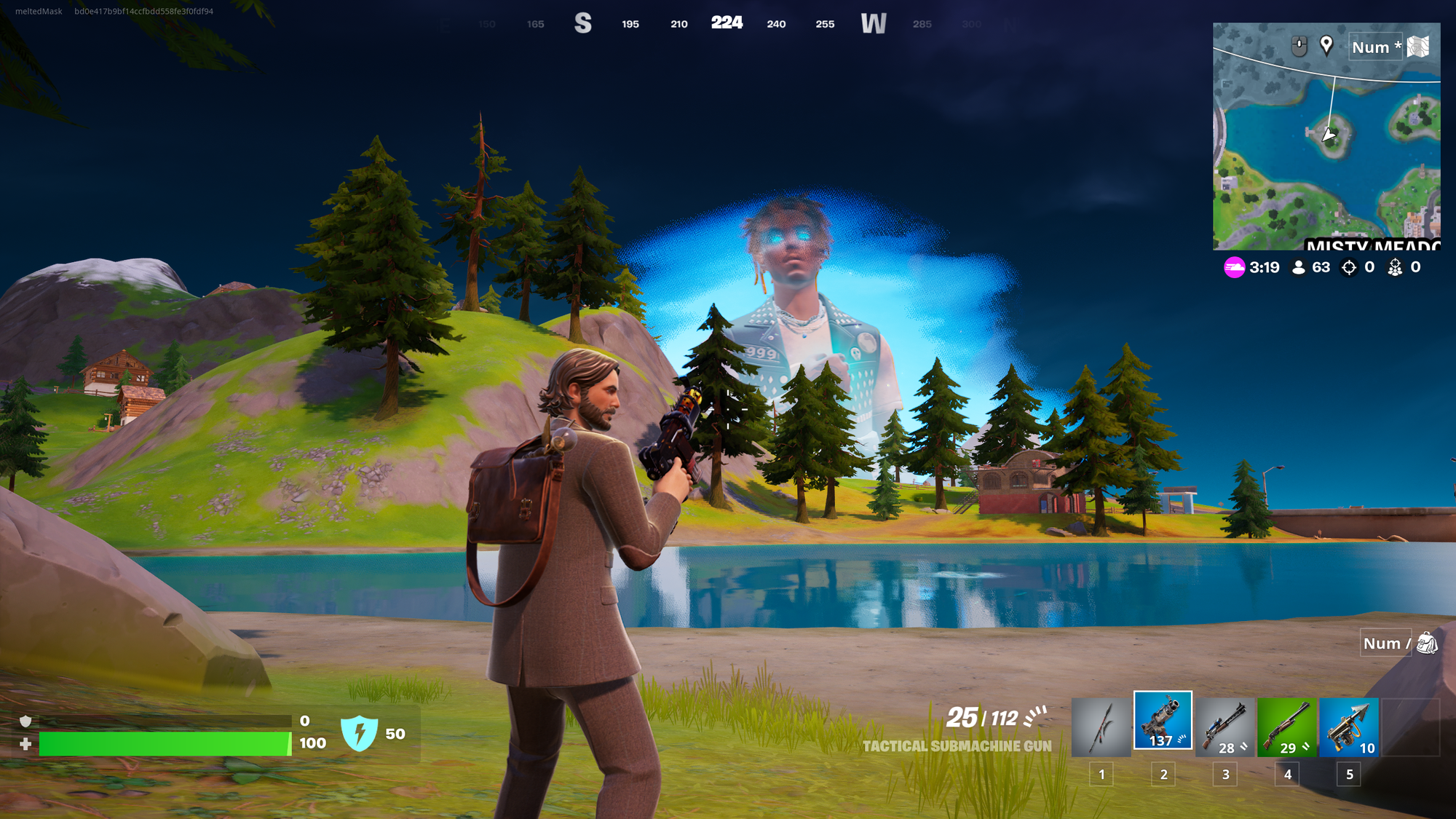Should we put dead people in Fortnite?
Juice WRLD's digital memory dominates the skies of the online shooter, years after his death. The ethics seem underexamined.

There's a huge ghost in Fortnite right now.
Beyond the shoreline of the island where all the shooting and looting happens, an ethereal man stares down at busy gamers. Hundreds of feet tall, with blue light pouring from his eyes, a digital representation of the American rapper Juice WRLD (pronounced "Juice World") currently sits on the horizon in every match of Fortnite Battle Royale. It's just another strange thing in a strange game where Alan Wake can meet Eminem, shoot him in the face, then drive off in one of the cars from Rocket League.
At even the quietest moments, Fortnite is a hellish firehose of Content with a capital C; an endless parade of cultural grotesqueries built to siphon currency from the average gamer by feeding them shiny objects and allowing them the dopamine rush of killing the big chicken from Family Guy. Don't get me wrong, it's a well made product with a fun game in the middle, it's just also a loud mockery of modern art and entertainment. For better or worse, it is whatever you'd call the opposite of a museum. Shallow brand deals and celebrity cameos are ubiquitous in the world of Fortnite.
Juice WRLD passed away in 2019, though. That spirit kaiju is the impassive ghost of an actual dead man. And that feels fundamentally different to Epic adding Lara Croft's backpack or someone called TheGrefg (a web search tells me this is a form of YouTuber). Juice was a human being, and is now a memory, wholly unable to say yes or no to collaborations, the use of his likeness, or being turned into a huge, terrifying spirit.

This is at least ethically curious, if not outright concerning. Big companies puppeteering our corpses after we die sounds fundamentally bad, actually; a final indignity delivered from the factory floor of capitalism.
The important context in the case of Juice WRLD (a.k.a. Jarad Anthony Higgins) is as follows: he really liked Fortnite when he was alive, and his mum said it was okay. Juice was a big fan of the game by all accounts, but particularly by the accounts of the people making Fortnite and his mother, Carmela Wallace. In a quote wrongly attributed to a Sports Illustrated interview by most of the internet, and actually attributed to a press release by the publication itself, Wallace stated:
"Jarad always loved to play Fortnite — it was more than just entertainment for him, it was a way to connect with others. From a young age, video games were a part of how he bonded with friends and family, and being in Fortnite is an incredible tribute to that connection."
Fortnite players are fans of him too, apparently clamouring for such a tribute. In an interview with Gamespot, Epic's head of global partnerships Nate Nanzer stated the players had been "asking for years and years," but that they wanted to do things "in the most respectful way possible." The interview gives some time to the inclusion of Juice WRLD's mother and doing the right thing, but spends far more energy making sure we know this is what the fans really wanted. This is for the fans. We have to give the fans what they want. The fans must be sated.
We can certainly ask the fans, and his mum, and any heads of global partnership or vice presidents of synergistic brand fusions. We can't ask Juice WRLD.

Return of the Famous Dead
This particular celebrity is hardly the first to be posthumously included in events, products and media without their permission. In 2016, Rogue One: A Star Wars Story featured computer generated copies of actors Peter Cushing (1913-1994) and Carrie Fisher (1956-2016). Fisher is said to have liked the work done in the film, but the attitude to Cushing's inclusion seems to have been eerily similar to the Epic's approach to Juice WRLD. We know he would have approved. It's not even worth considering a world where he didn't approve, because we already did it. It was respectful and, coincidentally, very profitable.
Human puppet crafting isn't always so easy for brands and the loved ones of dead people. In 1966, the family of known Dracula Bela Lugosi sued Universal Pictures for continuing to use Lugosi's likeness in merchandise beyond the limits of the actor's original agreement with the studio, and beyond Bela Lugosi's death. Lugosi's heirs were originally victorious, but lost when Universal appealed the decision. The California Supreme Court determined that a dead person had no rights to their own likeness, and that such rights did not pass down to any heirs.
It wasn't until 1986, by the way, that the California Celebrities Rights Act created an inheritable right to a person's likeness, and the law wasn't made retroactive until 2007. In case you had any doubts about how much a corporation cares about your general existence as a human being.
The list goes on, increasing in frequency as technology makes zombifying public figures easier and easier. Film directors Anton Ernst and Tati Golykh announced in 2019 that they were planning to make a war film starring James Dean, 64 years after his untimely death; despite their claims that Dean was simply the perfect choice for the role, unable to be matched by a single living actor, the pair had originally tried to cast the also-dead Elvis Presley, and been turned down. In 2020, a holographic version of deceased singer Whitney Houston appeared on stage; a similar stunt was floated for Prince, before the resurfacing of a Guitar World article where he explicitly stated that the idea of performing with a past artist was "the most demonic thing imaginable." While making the documentary Roadrunner: A Film About Anthony Bourdain, director Morgan Neville recreated Bourdain's voice with machine learning so it could speak words written by Bourdain while he was alive. A post from Bourdain's ex-wife suggested he wouldn't have approved. But it's too late now, and he's dead.
Harold Ramis, Tupac Shakur, Ian Holm.

Night of the Living Tribute
Time and again a certain kind of phrase turns up in these discussions. Directors, creators, studios, business owners and lawyers alike assure everyone that these copies are loving tributes to the artists; warm and well-intentioned acts done to preserve and enhance the memory of the dead. This is the case with Juice WRLD, and you could certainly argue that, rather than being a simple cash grab, platforms like Fortnite represent an evolution of the natural grieving process for a digital society. Fortnite contains everything, after all, it makes sense it should contain some representation of our grappling with the transience of existence.
Humans have been carrying out strange death and memorial rituals ever since we started dying. Western cultures bury their dead in wooden boxes, of course, where everyone gathers around and speaks their memories of the central character. We burn them too, a symbolic releasing of the person from those who loved them.
Societies have sealed coins into corpses' mouths, built enormous towers on which to display the deceased, pushed the dead out into lakes and set them on fire, consuming the flesh of those who passed on.
Perhaps, then, there's room in a 21st century world for technology-minded rituals. Particularly as so many people spend significant parts of their lives on devices, and as forming strong bonds with people far further away than would ever have been probable or common in previous centuries. Games like Overwatch and World of Warcraft contain various tributes to deceased players, generally done in a respectful and muted manner. Is there that much difference between a tasteful wake and a solemn march through digital fields? Human beings have an innate need to process the concept of death, more so the closer death comes to our own lives, and it makes sense for death-adjacent rituals to move with the times.
So what's so discomfiting about putting a much-loved rapper in the skybox of his favourite video game?
Blood Money
Well, people are profiting from it. Even if we assume honesty when it comes to Epic's intentions for the Juice WRLD tribute, even if it genuinely does make the fans happy in a very altruistic and human sense (and not just because this is their preferred form of shiny objects), everything connected to Juice WRLD in Fortnite is a commercial or marketing product designed primarily to make money.

If you are actively making money from someone's likeness and work then you are not to be trusted as an arbiter of the ethics and appropriateness of that action. You have a vested interest in making sure that not only is this 'collaboration' (a term used loosely, as you can't collaborate with someone without their consent) successful and well-received, but that more and more of them happen ongoing. One thousand Nate Nanzers explaining how respectful putting a dead person in a video game is does nothing to move the needle.
Juice WRLD is debuting new music in Fortnite soon; they've built a whole island where you can go and enjoy it, while spending more V-Bucks. There's another quirk of language in there too; he isn't releasing anything, because he's dead. As a species we tend to cling to those we've lost, speaking as if they're still with us. It's often a step in the grieving process.
But again, we're not talking about people here, we're looking at a corporation that has a profit motive for keeping artists fresh in the audience's mind. Juice WRLD didn't die really, he's alive in our hearts, and on the magic island inside our multi-million dollar digital platform.
You could experience Juice WRLD forever and ever, without anything so tricky as 'permission' to worry over.
News media about Juice WRLD's inclusion in Fortnite has had little to say about the ethics of raising the real-world dead in video games, aside from the odd sentence assuring people that it "brings up an ethical dilemma" of some description. There is a deafening shrugging of shoulders surrounding these sorts of decisions, as if it's a neutral position to agree such things set off ethic alarms and just let companies keep doing it anyway.
From my personal perspective—and I don't think you can avoid using personal perspective here, for something as heavy and individual as death—it's unsettling. A couple of days ago a whole squad of Fortnite players wearing Juice WRLD's skin advanced over a parked truck and tried to gun me down. It felt like being subjected to the emotional equivalent of an air horn. It's hard to unravel the intellectual meanings attached to being shot by a three cartoon copies of a dead man, but death always does seem to trigger something deep and unknowable in the human psyche. Part of the respect we afford to the dead is respect for the living, but part of it is a healthy fear of something inevitable and powerful.
Death makes people feel weird, essentially.
It should make you feel weird. Perhaps that means more discussion about appropriate and helpful expressions of grief and memorialisation, rather than letting corporations decide how we remember the dead. People in the 2020s probably do need something more nuanced and era-savvy than a wood box in the ground.
It's complicated, and we should cling to the complicated and human things that have defined us for thousands of years, rather than surrendering them to capitalistic slurry. Maybe that odd, uncomfortable feeling when you look up and see the glittering mega-corpse of Jarad Anthony Higgins is some indication that there's more to respecting the deceased than getting Epic to ask the dead guy's mum.
